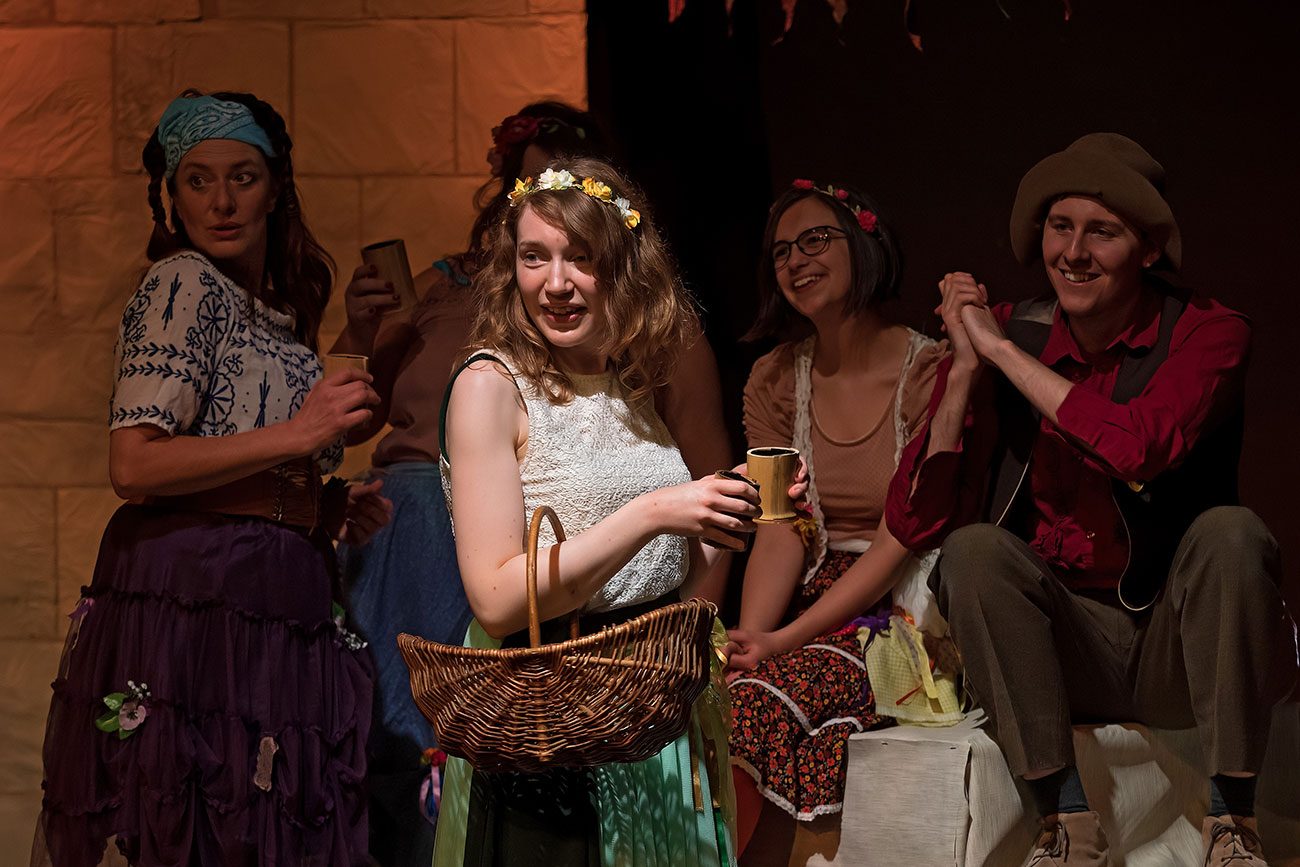The Winter’s Tale is classed as one of Shakespeare’s ‘problem’ plays; the problem with this one in particular being that it is imbalanced, confused and has a bizarre plot with more holes than poor Antigones after he gets mauled by a bear.
The Winter’s Tale by York Shakespeare Project
The John Cooper Studio @ 41 Monkgate, York
Till Sat Oct 28
£5-£15
It’s a play of two halves – a tragedy followed by a comedy if you like, but perhaps more accurately described as the Jeremy Kyle Show followed by Hair.
The play opens with a rather busy court scene and doesn’t really have a focus until the entrance of Sicilian King Leontes and his advisor Camilla.
Paul French as Leontes commands the audience’s attention in a nuanced performance contrasting quiet dignity with the paranoia bubbling under the surface.
He immediately gains our sympathy – no mean feat for a character whose first act is to accuse his pregnant wife Hermione (Juliet Waters) of cheating on him with his best mate Polixenes (Nick Jones) and throwing her in prison.
Seamless switch

Hermione’s stoical acceptance is problematic for a 21st century audience, albeit tempered by Paulina’s (Maggie Smales) more animated reaction. Leontes’ confidante Camillo is here recast as Camilla to excellent effect.
Elizabeth Elsworth makes the role look easy, switching seamlessly between Camilla’s various roles and challenges as she defies Leontes’ order to murder Polixenes and instead escapes with him to Bohemia. She is a complex character and Elsworth gives a memorable interpretation.
Hermione’s baby girl, born in prison and promptly exiled, is the focus of the second half of the play.
Perdita is now 15 and in love with an aimiable prince (Tom Jennings) very badly disguised as a shepherd.
Jess Murray’s Perdita is absolutely her father’s child, with huge stage presence, warmth and sincerity; her stillness and self-assured authority an effective foil to Florizel’s restless enthusiasm.
I particularly enjoyed her gleeful nod to Ophelia as she catalogued the flowers for the sheep-shearing festivities.
Joyful and sinister

Another highlight of the production is the original musical accompaniment provided throughout by York band Flora Greysteel, comprised of Emily Rowan and Simon Bolley.
This is at times understated, adding wonderfully complex layers of meaning to the play’s atmosphere. Sometimes joyful, sometimes sinister and always responsive, I would have liked to see the band integrated more into the action and more visible throughout.
As I had been hoping, some of the play’s more impenetrable acres of text have been cut, but more could have gone without the production suffering.
The scenes between the Clown (Elizabeth Lockwood) and Autolycus (Claire Morley) are archaic and low on laughs, although these two actors have great charm and draw out as many as possible, providing most of the energy of the second half.
Human statue skills

More attention needs to be paid to blocking – for a third of the audience, the climactic scene of Hermione’s statue coming to life (amazing human statue skills from Juliet Waters!) and the reconciliation with Leontes is blocked by the backs of the other actors, and several other scenes are played to the back wall.
The set design is simple and effective, aided by David Harrison’s flawless lighting design, although some of the costume decisions verge on the sadistic.
Nick Jones gamely turns in a solid performance as Polixenes despite being dressed in tight purple trousers and a crown that looks like a spring-form cake tin.
Elizabeth Lockwood deserves a medal, a cruise holiday and a mindwipe for having to wear a costume that looks like an early draft of Mr Tumble from CBeebies.
Very privileged

As director Natalie Quatermass points out, no one knows “why Shakespeare wrote two such contrasting halves to this play”.
It can be something of a poison chalice for a director, and credit is due to her for taking it on. “I like to think,” she continues, “that… Shakespeare was still challenging himself and his audiences.”
I’m glad that York Shakespeare Project continues to do the same. We’re very privileged in York to be able to see these less popular plays and make up our own minds about them, with YSP taking the risks and challenges of their mission to produce every Shakespeare play in their stride.
I look forward to their next production!
